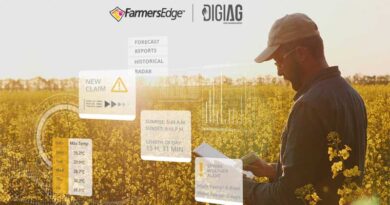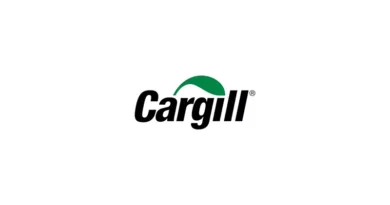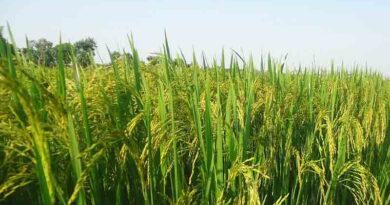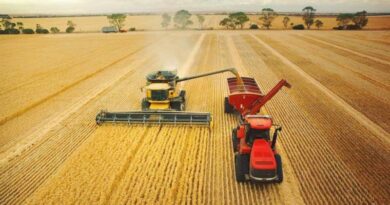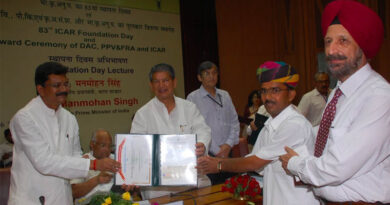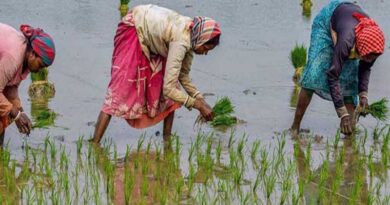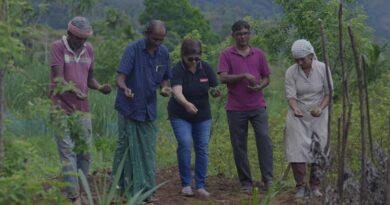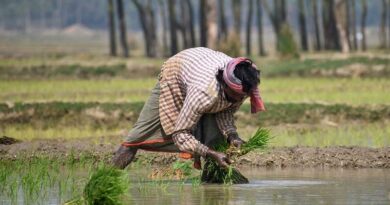Case Study: Protecting canola farmers from heat blast
08 March 2021, Canada: Challenge: Darin Strudwick has farmed all his life and recognizes that agribusiness is akin to being a professional gambler. But, like a professional, he does everything he can to mitigate risks, and using Farmers Edge technology does just that. There are many factors out of a grower’s control, like disease, pests, and the weather; with climate change, those factors are becoming more extreme.
In 2021, Strudwick planted 2,200 acres of canola, one of Canada’s leading exports and generator of Canadian jobs across the value chain. Twenty million acres are grown across the Canadian prairies, with yields increasing annually.[1] “We planned for a yield of 50 bushels an acre and fertilized to meet that target. Knowing that canola is vulnerable to heat blast, we added Canola Heat Blast coverage from Farmers Edge.”
Canola is susceptible to excessive heat during the day, especially with a concurrent lack of night cooling. When daytime temperatures climb above 28°C and night temperatures above 16°C, canola experiences heat blast, severely impacting plant health, including bud development, flower fertility, and subsequent pod and seed production. Heat blast results in empty, missing, or misshapen pods, ultimately reducing harvest yields. If the heat subsides, regular pod formation can return, but as we saw in 2021, the heat did not subside until after harvest, leaving the plants no time to recover.
Solution:
Canola Heat Blast Yield Protection
This parametric insurance solution is affordable, easy to use, and eliminates the paperwork and hassle of filing a claim for busy growers. Farmers Edge customers simply choose which fields they wish to insure, and their digital platform, FarmCommand, does the rest. It will passively collect all the data required, including temperature, field conditions, and planting date, then trigger a guaranteed claim when excessive heat thresholds are met. All data is shared seamlessly and in real-time amongst key stakeholders, expediting the insurance settlement process and eliminating the need for a claim adjustment. Best of all, it is fully transparent and requires no supervision on the part of farmers.
The registration process was straightforward. Strudwick signed up just after he planted and provided the insurer with some baseline data from FarmCommand about the fields he wanted to cover.
In July and August, the Canadian prairies experienced some of the hottest temperatures on record. Strudwick had 12 days with temperatures above the 28°C threshold. These extreme temperatures were out of the ordinary. Strudwick says, “We’ve had hot spells before, but this seemed to drag on all summer. It was crazy.”
At planting time, Strudwick estimated he would see a yield of about 50 bushels per acre of canola. The impact of the heat dropped that yield down to about 25 bushels per acre, a big hit on a high-value crop like canola.
After the temperature hit the threshold, the automated system filed a claim, with no input from Strudwick. “We didn’t have to submit an actual claim; if this was hail insurance, we would have to phone in and state our claim. So, this was all automatic.”
Compared to other types of insurance and their prolonged claims process, Strudwick received his heat blast payout quickly.
“Insurance is more of a tool for us to ensure that we meet the bottom line, and this gives us a cushion. It was an exceptional year, but Canola Heat Blast Yield Protection worked for us, so I would recommend it to other farmers.”
— Darin Strudwick
Farmers Edge Technologies:
Smart VR Solution
- A solution that brings sustainability, productivity, and profitability together to help farmers produce high-quality, high-yielding, and low-carbon grain.
Canola Heat Blast Yield Protection Insurance
- High-tech parametric insurance designed to protect canola growers from the risk of extreme weather and mitigate the financial damage it can have on yields.
- A program that rewards farmers for their land stewardship and helps them generate verifiable, high-quality carbon offsets for sale on the carbon market.


